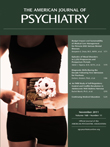An Early Study of an Intervention With Children of Psychotic Mothers
To the Editor: It may interest readers of the article by Wickramaratne et al. (1) on the children of depressed mothers that a study of a similar population with similar goals was conducted four decades ago. The Intensive Nursing Aftercare Project (2), in which we participated, recruited 50 psychotic mothers with children age 5 or younger who were matched with neighborhood comparison subjects. Based on a random selection, half of the psychotic mothers were offered a weekly 1-hour visit by specially trained psychiatric nurses, and the other half were offered a monthly brief visit. The children were evaluated as they entered the study and 2 years later at the end if the intervention.
We found that there was very little difference between the weekly (intensive) treatment group and the monthly (minimal) treatment group, but there were several problems with the study. First, the treatment that the mothers received was highly psychoanalytically influenced, and medication for depression was not adequate at that time. Second, diagnosis of the mothers' mental illness was clinical and not up to current standards. Finally, a major ethical problem arose when the monthly treatment group required help, and we felt obligated to offer it.
The random treatment group assignment is a study design that was advanced for its time. In addition, other findings included the attentional difficulties of the children of mothers with schizophrenia (3) and the fact that some of these children functioned at an unusually high level (4). We also found that the children of depressed mothers performed less well on careful assessments of development than the children of mothers with schizophrenia, who could more easily separate themselves from their mother's distress (3).
1. : Children of depressed mothers 1 year after remission of maternal depression: findings from the STAR*D-Child study. Am J Psychiatry 2011; 168:593–602Link, Google Scholar
2. : Children of parents hospitalized for mental illness, II: the evaluation of an intervention program for mentally ill mothers of young children. J Child Contemp Soc 1983; 15:57–66Crossref, Google Scholar
3. : Disturbance of attention among schizophrenic, depressed, and well mothers and their young children. J Child Psychol Psychiatry 1977; 18:115–135Crossref, Medline, Google Scholar
4. : Superkids: competent children of psychotic mothers. Am J Psychiatry 1979; 136:1398–1402Link, Google Scholar



